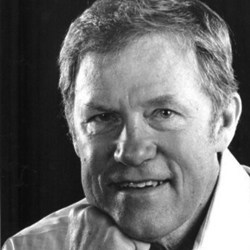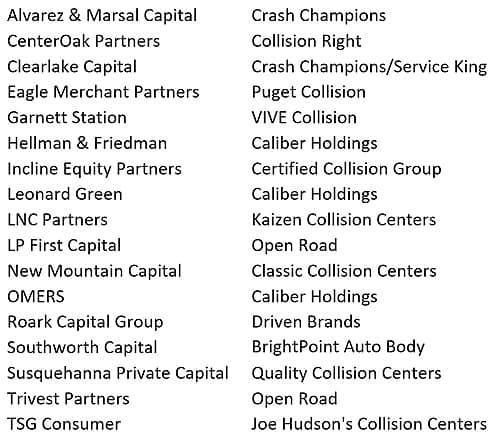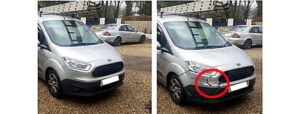Private equity firms continue to invest more capital with implications for MSOs and single shops that cannot be ignored
Scale is paramount to performance in the consolidation of the $36 billion collision repair market. Private equity provides the fuel that accelerates the consolidation. And private equity firms continue to invest more and more capital with implications for MSOs and single shops that cannot be ignored.

A Bit of History
Private equity (PE) investors have been investing in the collision repair industry since 1998. Like their investments in many other consolidating industries, the rewards to PE investors have alternated between promises and disappointments. Each new iteration of opportunities draws in new investors even as the disappointed ones exit.
The current roster of PE firms invested in the collision repair industry is more extensive than ever. Out of seventeen total PE firms, seven of them have entered in the last four years.
A complete history of private equity investments in the industry would take many more pages than are available in this commentary, but we mention in passing that there have been six distinct phases of PE investment in the collision repair industry.
- Conceptual
- Value Destruction
- Recapitalizations
- Bulking up
- Exits
- Experienced Leadership
During the Conceptual investment phase, private equity firms, insurance companies, and one OE manufacturer made investments in the nascent opportunity to consolidate and build large MSOs. At that time, there were almost no MSOs operating at scale with sophisticated management teams. Executives experienced in other industries were learning on the fly how different it was managing collision repair operations.
During the Value Destruction phase, even the hard-won experience among the new consolidators didn’t save the early conceptual investors from disappointing outcomes as Ford, Allstate, Oakhill Capital and others exited with significant equity losses. Blackstone’s 2014 investment in Service King was effectively gone in 2022 when they defaulted on their bonds.
Successful Recapitalizations, however, rewarded the second round of PE investors in the industry such as ONCAP which recapitalized Caliber in 2008. ONCAP then realized huge gains in a subsequent sale to OMERS along with Palladium’s exit from ABRA in its sale to Hellman & Freedman.
Carousel Capital acquired control of Joe Hudson’s in a recapitalization in 2014 and then successfully exited with a sale to TSG Consumer in 2019.
Another notable recapitalization was The Carlyle Group’s investment in what was then the largest independent MSO, Service King. Two years later in 2014, Carlyle realized a significant gain by selling much of its position in Service King to the Blackstone Group.
Bulking Up
Hellman and Friedman bulked up by merging ABRA with Caliber, adding another PE partner, Leonard Green and Company, while focusing increasingly on greenfield development expansion with its much higher ROIs. With the experienced Caliber team running the combined operation, Hellman and Friedman has recently been increasingly telegraphing their own intentions to go public by bringing on a new CEO and CFO.
Perhaps the most successful private equity investor in the industry has been Roark Capital, which acquired Driven Brands with its MAACO and Meineke brands from Harvest Partners in 2015. Its subsequent acquisition of the Carstar franchise was followed by more collision repair acquisitions including the Fix Auto USA and ABRA franchises in 2019. In this bulking-up phase, Driven invested heavily in other multi-location aftermarket companies including Car Wash International, 1-800 Radiator and Take 5 Oil Change.
Exits — Successful and Unsuccessful
Successful exits by PE firms may take several different forms — selling part or all of a position to another PE firm, taking on substantial debt and paying themselves a dividend or going public. ONCAP, Carousel, Harvest Partners and Palladium all sold out completely to other PE firms. OMERS and Carlyle earned multiples of their original investments. As mentioned above, exits by sale to larger PE firms included Carousel’s sale of Joe Hudson’s Collision and Harvest Partners’ sale of Driven Brands to Roark Capital, both with significant capital gains.
KCB Private Equity invested in Kadel’s Collision in 2007 and successfully exited in a sale to ABRA in 2015. VergePointe Capital acquired Herber’s, a six-shop Edmonton, Alberta MSO in 2017 and recently sold to Lift Auto Group, a Canadian repair consolidator.
Unsuccessful exits include the original investors in M1 Collision (Blue Capital, Heller Financial), Caliber Collision ( Oak Hill Capital, Capital Z), Collision Team of America (Ford), Sterling Collision (Allstate Insurance) to note some of the more prominent investors. These investors lost most of their equity investments.
Only one private equity owner has exited via the public markets. After its six years of investment in the industry, Roark Capital realized huge gains by taking advantage of a favorable IPO window by taking Driven public in 2021.
Experienced Leadership
The Experienced Leadership phase arguably began with Carlyle’s investment in Service King in 2012. That investment in one of the largest non-sponsored MSOs with a long-time experienced operating team initially worked well until a variety of challenges diminished the opportunity.
Undeterred by the Service King experience, or perhaps, educated by that failure, new PE investors recognized that the industry had matured sufficiently to allow them to follow the tried-and-true PE playbook that has worked well in other verticals.
- Find a strong platform in an attractive market
- Pay handsomely for the initial platform and superior management
- Bulk up revenues and geographic reach with add-on acquisitions at lower multiples of EBITDA
- Improve EBITDA and management teams
- Recapitalize the platform and take some chips off the table
- Continue rapid growth with more acquisitions, more markets, and increase EBITDA with more brownfield and greenfield locations
- Sell out to larger private equity firms whose AUM size compels them to make much larger investments. ($20 billion private equity firms find it difficult to make acquisitions where they can deploy only $10 to 30 million)
- Take the enterprise public in an IPO or via a strategic merger
The Newest PE Players
Ten new PE entrants in the last three years attest to the attractiveness of the industry. Each acquired platform has accomplished rather extraordinary revenue growth and deployed significant levels of capital. Below, we estimate the number of shops and run rate revenues as of the end of Q1 2023.
In 2020, four new PE firms entered the industry. First out of the gate was the initial capitalization of Crash Champions by Alvarez & Marsal Capital which teamed up with an aggressive CEO, Matt Ebert, with his eight shop Chicago based MSO. Together with mezzanine lenders they launched the fastest ever growth platform in the industry, largely staffed by former executives from Service King. Following a merger (of sorts) with Service King in the summer of 2022, the combined entity now operates more than 600 shops with $2+ billion in run rate revenues.
The year 2020 saw three additional PE firms invest in the industry. New Mountain Capital teamed up with former ABRA executives led by Toan Nguyen to acquire Classic Collision in Atlanta. The initial 24 shop, $110 million revenue platform has since grown to 220 shops with more than $1b in current run rate sales in just 3 years.
Susquehanna Private Capital entered with a “CEO first” approach by hiring Jerod Guerin, a former senior executive at Service King. In three years, Quality Collision Group has grown to more than 50 shops and estimated run rate revenues of $260 million.
Center Oak Partners also entered the industry by backing Rich Harrison, a proven multi-location auto services executive, and began acquiring platforms less than four years ago. It has now reached more than 80 shops with an estimated $300 million of run rate revenues.
In 2021, LNC Partners backed Jacob Tilzer, another experienced entrepreneur with deep roots in the industry. His original 10 shop platform, Kaizen Collision, has now expanded to more than 48 shops with approximately $180 million in run rate revenues, aided by additional debt capital.
2022 saw three more new entrants including LP First Capital and Trivest Capital who partnered with long-time industry figure, Jim Guthrie, and the Car Crafters platform in the Southwest. In less than 12 months, OpenRoad Collision has grown to 15 shops and $75 million in run-rate revenue.
Garnett Station Partners, formerly an investor in a successful multi-location MAACO entity, partnered with former Caliber executive, Vartan Jerian, to create VIVE Collision, now 22 shops strong primarily in the Northeast.
Newly formed in 2022, Puget Collision and CEO Joe Morella, a former Gerber executive, backed by Eagle Merchant Partners from Atlanta, has quickly acquired more than 25 Carstar and Fix Auto franchisees to reach more than $75 million in revenues in less than one year.
Why more PE investment now?
Industry tailwinds continue.
- Revenues are increasingly driven by parts and labor rate increases
- Non-cyclical sustainable cash flows continue
- The likelihood of an umbrella valuation event when Caliber Collision goes public
- An abundance of acquisition targets
- Relatively cheap acquisition prices at a time when capital is still readily available
But at the same time, industry headwinds are concerning.
- Rapidly rising cost of parts and labor is negatively impacting margins
- Extremely restricted pool of technicians is constraining growth
- Increasing capex for technology-related requirements
- Cost of capital is rising
What’s next for PE investors in the collision repair industry?
- Recapitalizations of existing consolidators. At least two are currently looking for new or additional sponsors.
- More new entrants. Multiple private equity firms are still waiting in the wings and looking for their first platform. No less than 10 additional firms have been scouring the industry for the right combination of platform size, superior management and attractive markets.
- Exits to much larger PE firms that have huge amounts of available capital to deploy.
- A possible IPO for Caliber if the markets and their results cooperate
Current PE firms and their collision industry investments

What Does It Mean for MSOs and Single Shops?
For MSOs, more well-capitalized buyers means more opportunities to exit, more opportunities for managers to grow with the acquirer, more competition in every market where private equity is making investments. It also means successful MSOs operating at scale can access the capital required to more aggressively expand and add locations, attract technicians, reduce parts and paint costs and develop brown and greenfield sites.
For single shops that are not at scale or planning to grow to a larger scale, more capital flowing to expanding competitors will make life increasingly difficult. Technicians at single shops will continue to migrate to larger entities where income is more stable and benefits are abundant. The costs of upgrading technology and training will adversely affect smaller operators, further reducing their competitive position.
Single shops will continue to find opportunities to sell to their growing competitors who have gained expansion capital from private equity funds. With more than twelve consolidators and many more regional and city focused MSOs looking for acquisitions, single shops may well find their best opportunities to exit while buyers are abundant.
About Focus Advisors
Focus Advisors is a collision industry’s M&A firm representing MSOs and single shops. We help entrepreneurs create and realize equity value by advising, raising capital and helping them sell their businesses. Led by Managing Director David Roberts with 25 years in the industry, he and his team of experienced professionals have closed more than 40 transactions, totaling more than 300 collision repair locations and $500 million in transaction value. Visit the website or contact David Roberts at david.roberts@focusadvisors.com or by calling 510-444-1173 for a confidential discussion.






Comments are closed.